If you want to donate items while decluttering your home, Habitat for Humanity’s ReStore is an excellent option in Denver. ReStore offers a great way to give new life to your unwanted items while supporting affordable housing initiatives. However, knowing what items they accept and how to make the most of your donation is essential. This blog will explore critical questions about junk removal services and related concerns. This is continuous from the Donation Pickup Page.
What Items Does Habitat for Humanity Not Accept Near Me?
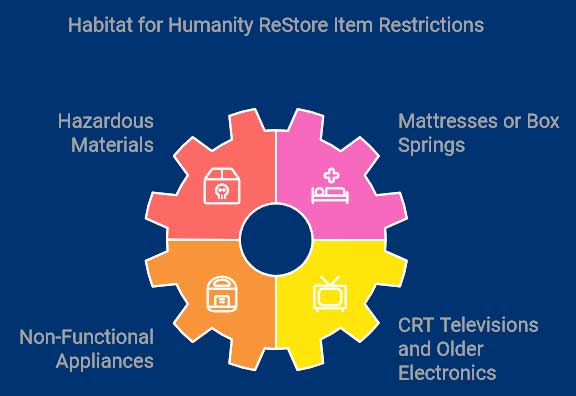
In Denver, Habitat for Humanity’s ReStore accepts various items, but they have clear guidelines on what they do not take. Generally, ReStore does not accept:
- Hazardous materials: This includes items like paint, chemicals, asbestos, pesticides, and anything considered dangerous or toxic.
- Mattresses or box springs: Denver ReStore locations do not accept used ones for hygiene reasons. Instead, you might want to consider contacting Spring Back Colorado for mattress recycling.
- Non-functional appliances: While they accept used appliances, items must be in working order and under ten years old. Broken stoves, fridges, or dishwashers will be rejected.
- CRT televisions and older electronics: Older electronic devices, especially CRT (cathode-ray tube) televisions, are not accepted. They prefer newer models, such as flat screens and small electronic devices that are still operational.
However, they do accept many other items, including:
- Furniture: Gently used sofas, chairs, tables, and dressers in good condition.
- Appliances: Refrigerators, washers, and dryers that are fully functional.
- Building materials: Surplus lumber, bricks, tiles, and light fixtures from renovations or construction projects.
- Tools: Both hand and power tools are accepted if they’re in working order.
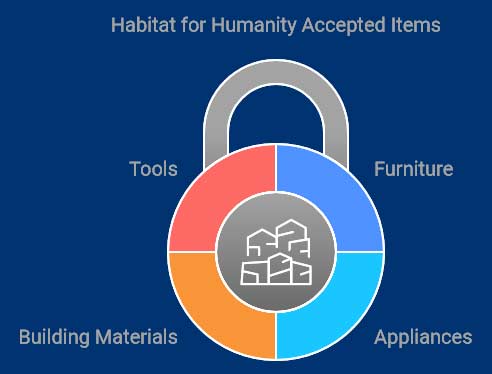
It’s always a good idea to check their website or call them to confirm whether they can accept your donation.
Does ReStore Take Dressers?
ReStore accepts gently used dressers as long as they are in good condition, free from damage, and do not lack essential components. Items should be ready for resale without requiring significant repairs.
What is the Best Charity to Donate Used Items to?
While most charities are excellent options, others, like Goodwill and The Salvation Army, also accept used items. If you want to support housing development, Habitat for Humanity remains a top choice in Denver.
Who is Best to Donate Furniture To?
For furniture donations, Habitat for Humanity and Goodwill are two trusted organizations. Habitat’s ReStore specializes in home improvement and furniture, so it’s ideal if you have pieces like sofas, chairs, and tables to donate.
What Not to Give to Charity?
Items that are broken, stained, or unsafe should not be donated. This includes damaged furniture, worn-out mattresses, and non-functioning appliances. Charities can only accept items they can sell, so ensure everything is in good condition.
What Items Do Charity Shops Not Want?
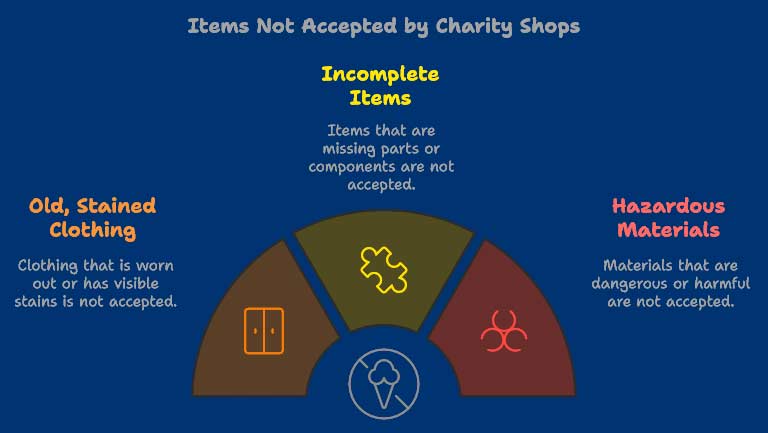
Charity shops generally don’t accept:
- Old, stained clothing
- Items with missing parts
- Hazardous materials (paint, chemicals, flammable items)
Always check with your local donation center before dropping off any items.
Can You Negotiate the Price at ReStore?
Yes, some ReStores allow price negotiations on certain items. However, policies may vary, so it’s worth asking the staff before negotiating.
How Do I Donate a Mattress Near Me?
Due to hygiene concerns, Denver does not typically accept mattresses. However, you can check out specific mattress recycling programs, such as Spring Back Colorado, which specializes in recycling old mattresses.
Does ReStore Take Mirrors?
Yes, Denver’s ReStores accept mirrors. Still, there are specific guidelines for fragile items like these. Mirrors must be in good condition, without cracks, chips, or broken frames, as damaged items cannot be resold and pose safety risks during handling and transport.
Guidelines for Donating Mirrors and Fragile Items to Denver ReStores:
- Condition: Mirrors should be free from any damage. Cracks or breaks will make them ineligible for donation.
- Size Restrictions: Check with your local ReStore for any size restrictions. If more giant mirrors pose a challenge for storage or transport, they may not be accepted.
- Safety: All mirrors must be securely packaged or wrapped to prevent breakage during drop-off or pickup. Bubble wrap or cardboard to cushion the glass is advisable.
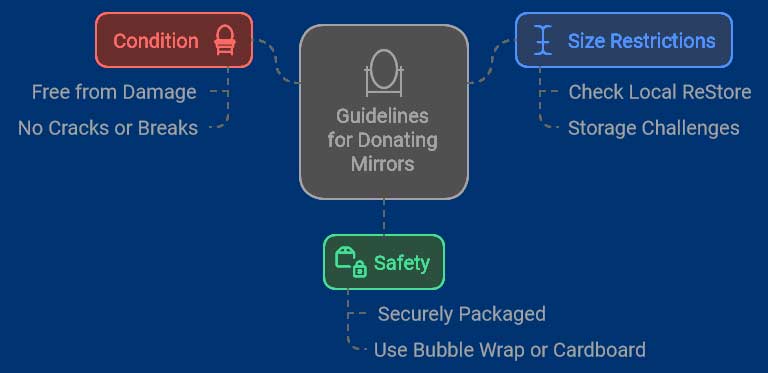
What Can I Do with Unwanted Tools?
ReStore often welcomes tools as long as they are still operational. Whether hand tools, power tools, or garden tools, these items can be repurposed by new homeowners or DIY enthusiasts.
Who Created Habitat for Humanity?
Habitat for Humanity was founded in 1976 by Millard and Linda Fuller in Americus, Georgia. The organization’s mission is to build homes for needy families, utilizing volunteer efforts and donations.
How Do I Schedule a Donation Pickup in Orange County?
For those in Orange County, you can easily schedule a donation pickup by visiting the ReStore website or calling their local office. Denver residents can follow a similar process by contacting their local ReStore for donations.
What is the Most Trustworthy Charity?
Several charities are rated highly for trustworthiness, including Habitat for Humanity, Doctors Without Borders, and St. Jude Children’s Research Hospital. These organizations are known for allocating funds directly to their programs.
What Can You Not Donate to Vinnies?
St. Vincent de Paul (Vinnies) has similar donation restrictions to Habitat for Humanity, often declining:
- Large, non-functional appliances
- Hazardous materials
- Mattresses
Guide to Responsible Donations and Disposal in Denver
It’s crucial to avoid donating items classified as hazardous waste. Our What We Take page provides detailed information on items we handle, helping you identify what can be responsibly donated or requires particular disposal.
Since Habitat for Humanity does not accept used mattresses, consider recycling them through specialized services. Our Appliance Recycling Services page offers insights into proper disposal methods for items not received by standard donation centers.
Alternative donation options are available for items not accepted by them. Our Where to Donate guide provides information on various organizations that accept different types of donations, ensuring your items find a suitable new home.
By following these guidelines and utilizing the appropriate resources, you can ensure your donations are helpful and compliant with local regulations.
If you’re looking for assistance with donation pickups, Super Junkers offers donation pickup services to help you responsibly donate your items. Additionally, our Furniture Removal Services can assist with removing large items that donation centers may not accept. For more information on where to donate various items, visit our Guide on Donation Locations.
Who Will Pick Up Furniture in Denver?
Suppose you need to donate furniture but don’t have the means to transport it yourself. In that case, several organizations in the Denver area offer furniture pickup services, typically for a small Fee or donation. This ensures the service is used for genuine contributions rather than as a free trash removal option. Here’s a comparison of furniture pickup services in Denver, including ReStore, which focuses on providing affordable housing solutions.
Which Charity Gives the Most to the Needy?
Direct Relief and Habitat for Humanity are known for dedicating many donations directly to those in need, making them excellent choices for donors focused on impact.
Which Charity Helps the Poor the Most?
Charities like Oxfam, Habitat for Humanity, and The Salvation Army are all heavily involved in helping those in poverty by providing housing, food, and other essential services.
What Charity Do Most People Donate To?
Charities like Goodwill, Salvation Army, and Habitat for Humanity commonly receive a high volume of donations due to their accessibility and broad range of accepted items.
Which Charities Give the Least to Their Cause?
Before donating, checking a charity’s ratings on platforms like Charity Navigator is essential. Despite their size, some organizations spend more on overhead than their actual programs, which can be a red flag.
Are There Clothes You Should Never Donate?
When donating clothes to charity, it’s essential to understand that not all items are suitable for donation.
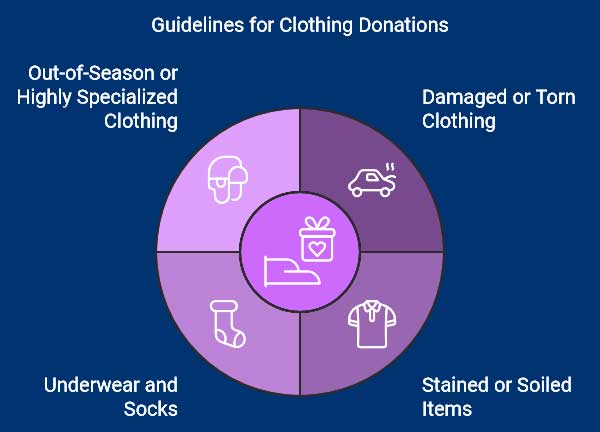
Charities like Denver’s ReStore and Goodwill and The Salvation Army have specific guidelines to ensure the clothes they receive can be resold or distributed to those in need. Here’s a breakdown of what is generally accepted and not accepted by these organizations:
What Clothes Not to Donate:
- Damaged or Torn Clothing: Clothing with rips, holes, or significant wear and tear cannot be resold or reused. It’s better to recycle such items or repurpose them as rags.
- Example: A shirt with missing buttons or a jacket with a broken zipper would likely be rejected.
- Stained or Soiled Items: Charities do not accept clothing with stains, odors, or mildew. They prefer clean, ready-to-wear clothing for resale or distribution.
- Example: Clothes with food or oil stains or items stored in a damp environment should not be donated.
- Underwear and Socks (unless new): Used undergarments and socks are generally not accepted for hygiene reasons unless they are brand new and still in their original packaging.
- Example: Don’t donate old or worn-out underwear or socks; consider Recycling or discarding them.
- Out-of-Season or Highly Specialized Clothing: While donating your out-of-season wardrobe is tempting, charities typically prefer items that can be sold or used immediately. Winter coats are always in high demand in Denver, while off-season items may sit unsold for long periods.
- Example: Heavy winter coats during the summer or niche items (like a specific sports team uniform) may not be in high demand.
What Clothes Are Accepted by Denver ReStore and Similar Charities:
- Gently Used, In-Season Clothing: Charities always look for lightly worn, in-season clothing that can go directly to resale or distribution. This includes jackets, shirts, pants, dresses, and shoes in good condition.
- Example: A gently used pair of jeans, a lightly worn summer dress, or shoes with minimal wear are perfect donations.
- Clean and Undamaged Items: All items should be free of stains, rips, or missing parts (such as buttons or zippers). Clean items help ensure quick resale, maximizing their impact on charitable programs.
- For example, a blouse without any stains or shoes with no scuffs would be considered fabulous donations.
- Children’s Clothing: Gently used clothes are always in demand, especially for growing needy families. Ensure that the items are free from wear, stains, or tears.
- Example: A clean, gently worn baby onesie or a toddler’s jacket that’s in good shape can be donated.

Specific Guidelines for Denver ReStore and Similar Charities:
- Habitat for Humanity ReStore: Although primarily focused on home goods and furniture, some ReStores may accept clothing as part of seasonal campaigns or special events. It’s always best to call ahead and check what clothing donations they are currently accepting.
- Goodwill: Goodwill locations in Denver gladly accept all types of clothing but emphasize the need for gently used, clean items. They also offer a convenient tax receipt for donations.
- The Salvation Army: The Salvation Army thrift stores in Denver accept a broad range of clothing, especially jackets, shoes, and business attire. They request that all items be washed and undamaged before donation.
- ARC Thrift Stores: ARC is another excellent option in Denver. It accepts gently used clothing and resells it to fund services for people with intellectual and developmental disabilities.
Tips for Donating Clothes:
- Wash Before Donating: Always wash your clothes before donating them. Clean, fresh-smelling clothing is more likely to be accepted and resold quickly.
- Check for Damage: Make sure all items are in good condition, without rips, stains, or broken parts.
- Seasonal Donations: Consider donating items currently in season to help charities sell or distribute them more easily.
- Call Ahead: For specific guidelines, it’s always a good idea to call the donation center to confirm they are accepting clothing at that time and ask if there are any restrictions.
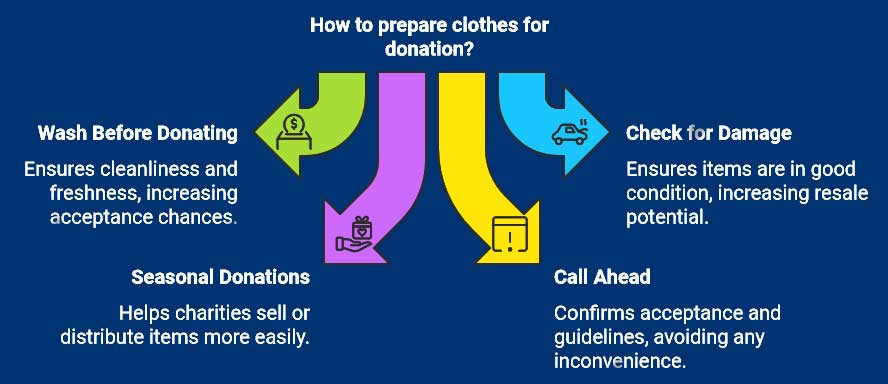
What’s the Conclusion?
Donating to Habitat for Humanity’s ReStore in Denver is an excellent way to declutter your home and help support affordable housing in your community. From gently used furniture to home improvement items, your donations can make a lasting impact. Following these guidelines ensures that your contributions are used well through resale or eco-friendly Recycling.
If you have items to donate or need help with junk removal, contact your local Habitat for Humanity ReStore today. Their team can help you schedule a pickup or advise on drop-off options. Whether donating furniture, appliances, or home goods, your contribution makes a difference for needy families.
Ready to Donate?
Call your nearest Denver ReStore or visit their website to:
- Schedule a pickup for more oversized items like furniture or appliances.
- Get specific donation guidelines for mirrors, tools, or building materials.
- Learn about their eco-friendly disposal methods for unsellable goods.
Essential Guidelines for Donating to Habitat for Humanity ReStore in Denver
They know the specific donation guidelines for ReStore in Denver. The Habitat for Humanity of Metro Denver—ReStore Donation Guidelines page provides detailed information on acceptable items, ensuring your contributions align with their needs.
For a broader perspective, the Habitat for Humanity International – Donate Goods to Habitat ReStore page offers general insights into the types of goods accepted and the impact of your donations.
It’s crucial to avoid donating items classified as hazardous waste. The U.S. Environmental Protection Agency (EPA) – Hazardous Waste provides comprehensive information on hazardous waste regulations, helping you identify items that should not be donated due to safety concerns.
Since Habitat for Humanity does not accept used mattresses, consider recycling them through organizations like Spring Back Colorado—Mattress Recycling, which specializes in mattress recycling in Colorado.
For items not accepted by Habitat for Humanity, Goodwill Industries of Denver – Donation Guidelines offers an alternative donation option with its guidelines.
Another option for donating items is the Salvation Army—Denver Adult Rehabilitation Center, which provides specific guidelines on what it accepts.
For proper disposal of electronics not accepted by Habitat for Humanity, refer to Denver Recycles – Electronics Recycling for guidance on environmentally responsible disposal.
By following these guidelines and utilizing the appropriate resources, you can ensure your donations are helpful and compliant with local regulations.





